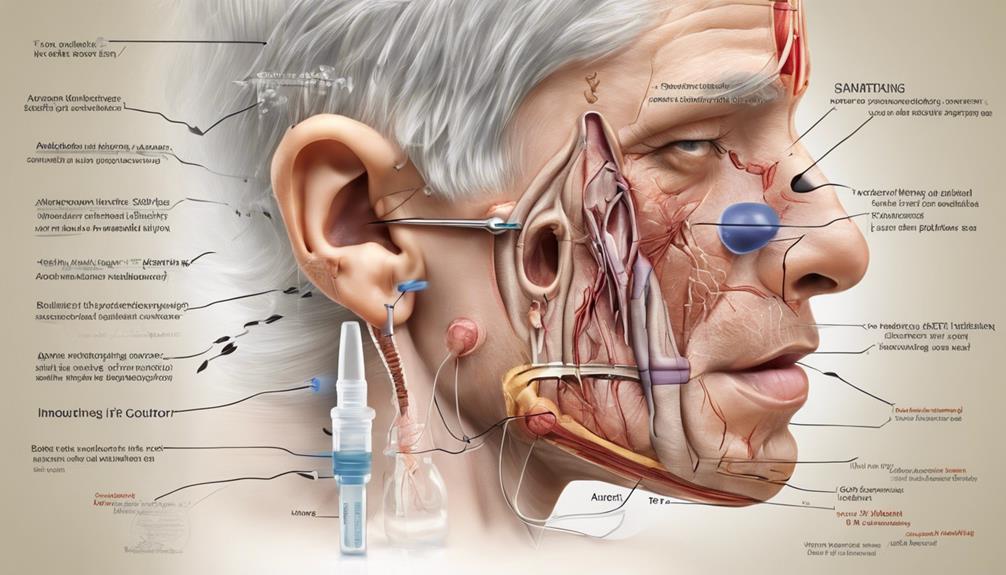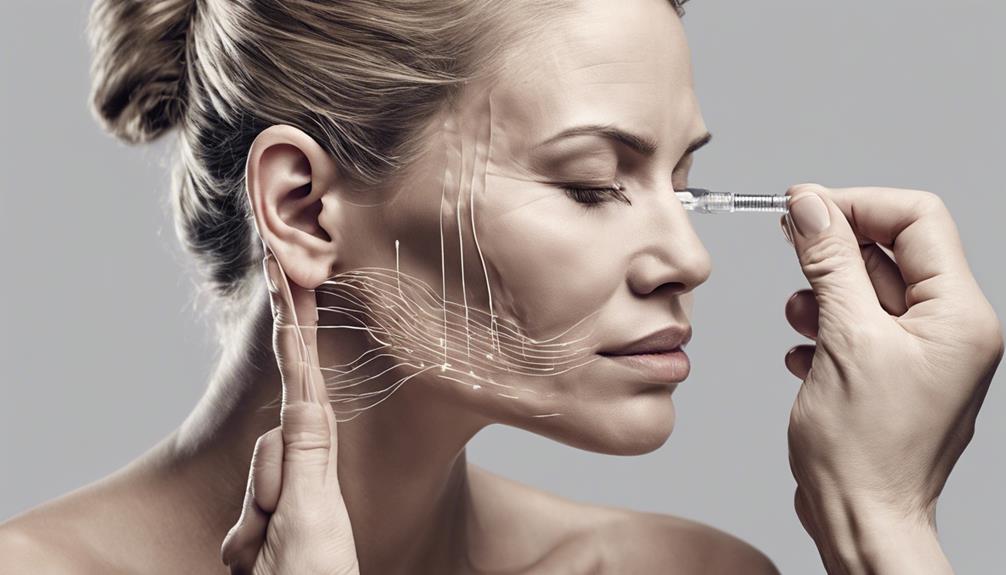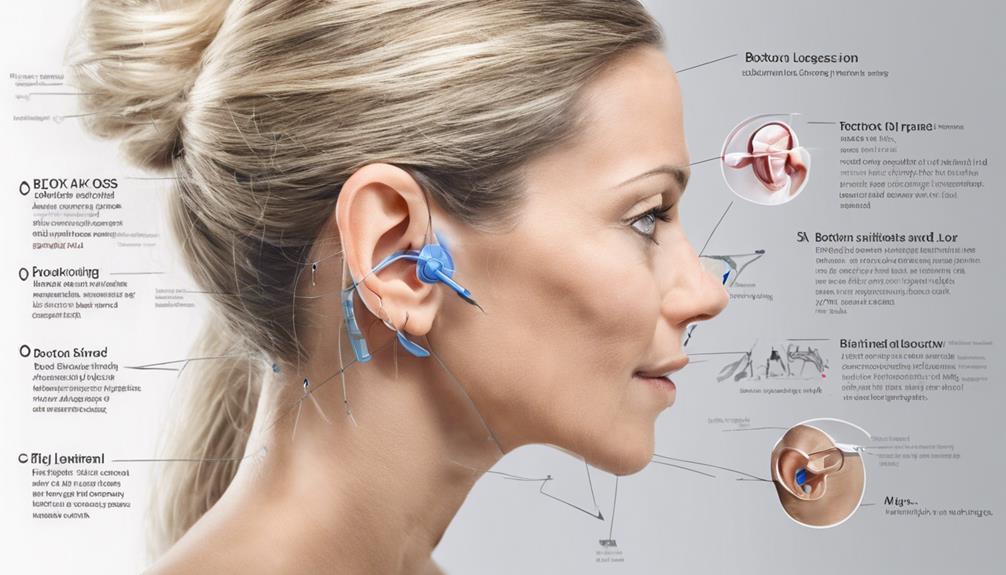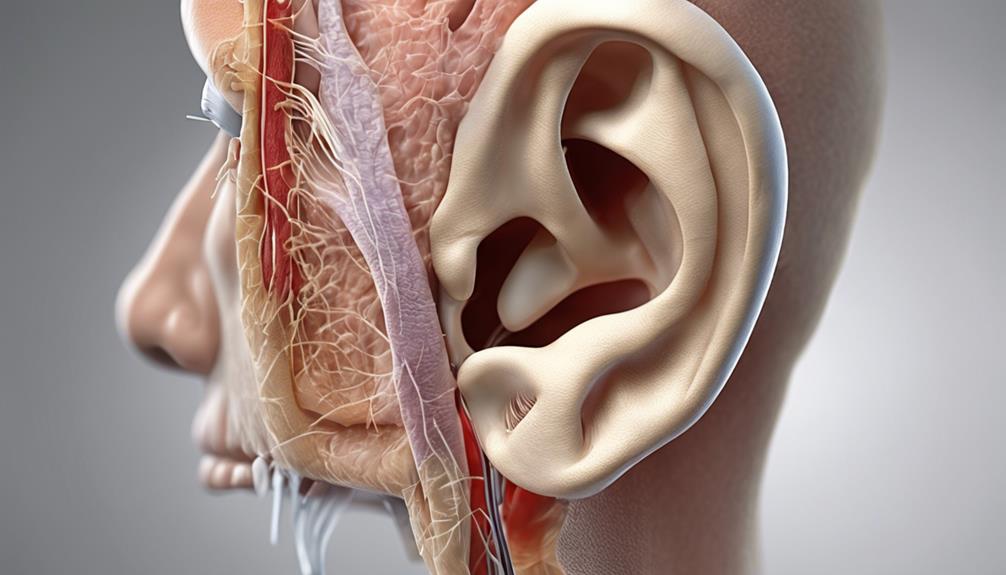Do you mean to say that Botox could potentially lead to hearing loss?
It may sound surprising, but the connection between Botox and auditory impairment is a topic that warrants attention and discussion.
As we explore the intricate relationship between these two seemingly unrelated realms, we uncover a complex web of factors that shed light on how Botox can impact one's hearing health.
Join us as we unravel the nuances of this intriguing correlation and delve into the depths of Botox-induced hearing loss.
Key Takeaways
- Botox injections may lead to hearing loss, tinnitus, and balance issues.
- Understanding the mechanisms of Botox-induced hearing impairments is crucial.
- Recognizing signs like sudden hearing loss and tinnitus post-Botox is important.
- Prioritizing auditory health and seeking professional guidance can prevent complications.
Understanding the Link Between Botox and Hearing
Examining the correlation between Botox injections and hearing complications requires a meticulous review of existing research and clinical observations. Reports have surfaced linking Botox injections to instances of hearing loss, tinnitus, and balance disturbances. These side effects have prompted concerns among medical practitioners regarding the impact of Botox on inner ear structures.
Patients undergoing Botox treatments are now advised to be vigilant about potential auditory repercussions, especially those with pre-existing conditions like Meniere's disease, where the risks are heightened. The intricate connection between Botox injections and hearing loss necessitates a deeper understanding of how this neurotoxin may affect the delicate mechanisms within the ear.
As investigations continue, imaging studies such as MRI, carotid ultrasound, and CTA scans are becoming standard practices post-Botox administration to evaluate any potential auditory implications. Unraveling the complexities of Botox-induced hearing issues is crucial in ensuring patient safety and refining treatment protocols in the future.
Mechanism of Botox-Induced Hearing Loss

When botulinum toxin from Botox injections spreads to nearby structures, it can potentially affect the nerves responsible for hearing, leading to a mechanism of Botox-induced hearing loss. The diffusion of botulinum toxin into the inner ear can disrupt the delicate structures involved in auditory processing, resulting in impaired hearing.
Ototoxic effects, such as hearing disturbances and tinnitus, may arise from the direct injection of Botox near the ear, increasing the risk of auditory complications. The neurotoxic properties of botulinum toxin can interfere with the transmission of signals within the auditory pathways, impacting the brain's ability to interpret sound correctly.
Understanding the intricate mechanisms by which Botox influences hearing function is essential for assessing the potential risks and benefits associated with its use. By unraveling the specific pathways through which botulinum toxin exerts its ototoxic effects, researchers aim to enhance the safety profile of Botox treatments and minimize the incidence of Botox-induced hearing impairments.
Signs and Symptoms of Hearing Impairment
The manifestation of hearing impairment following Botox injections can present through various signs and symptoms, including sudden or gradual loss of hearing, tinnitus, dizziness, balance issues, and disturbances in hearing clarity near the ears. When considering the effects of Botulinum on hearing, it's essential to recognize the warning signs that may indicate a developing problem.
Here are three key signs and symptoms to be aware of:
- Sudden or Gradual Hearing Loss: Individuals may notice a decline in their ability to hear sounds, whether it occurs suddenly or progressively over time.
- Tinnitus: Ringing in the ears can be a common symptom of hearing issues post-Botox treatment, indicating potential auditory system disturbances.
- Balance Problems: Dizziness, vertigo, or difficulties with balance may accompany hearing impairment, highlighting the intricate connection between the auditory and vestibular systems.
Monitoring these signs closely following Botox injections can aid in early detection and management of any potential hearing-related complications, which may require interventions such as hearing aids or specialized treatments for ear pain.
Preventing Hearing Loss During Botox Treatment

To mitigate the risk of hearing loss during Botox treatment, careful consideration of pre-existing auditory conditions is paramount. Patients with underlying hearing conditions, such as Meniere's disease, are advised to steer clear of Botox injections to prevent potential complications. Healthcare providers suggest exploring alternative cosmetic treatments for individuals already experiencing tinnitus or hearing loss to avoid exacerbating their auditory issues. Understanding the ototoxic effects of Botox, particularly when administered near the ear or head, is crucial in preventing hearing disturbances and ear pain. Before undergoing Botox injections, individuals with hearing conditions should be well-informed about the associated risks and necessary precautions to safeguard their hearing health. Making informed decisions by prioritizing hearing health and consulting healthcare professionals can play a vital role in preventing hearing loss both during and after cosmetic treatments.
| Hearing Conditions | Preventive Measures |
|---|---|
| Meniere's disease | Avoid Botox treatments |
| Tinnitus or hearing loss | Seek alternative cosmetic treatments |
| Ototoxic effects of Botox | Be aware of injection placement |
| Precautions before treatment | Understand risks and consult professionals |
| Prioritizing hearing health | Make informed decisions |
Seeking Professional Help for Auditory Health

Seeking guidance from specialized healthcare professionals, such as audiologists or otolaryngologists, is crucial for individuals experiencing auditory changes or disturbances following Botox treatment. When seeking help for auditory health post-botulinum injection, consider the following:
- Comprehensive Evaluation: Schedule a comprehensive hearing evaluation with an audiologist to assess the extent of any hearing loss or related issues accurately. This evaluation may include tests to evaluate hearing sensitivity, speech understanding, and middle ear function.
- Discuss Treatment History: It's essential to discuss your Botox treatment history and any concerns with a healthcare provider specializing in Hearing and Balance. This discussion can provide valuable insights into the potential impact of Botox injections on your auditory health.
- Regular Follow-ups: Follow up regularly with a healthcare professional specializing in ear health to monitor any ongoing auditory issues post-Botox administration. These follow-ups, ideally scheduled every three months, can help in managing any emerging concerns promptly and effectively. Remember, if severe auditory issues arise, you may need to stop Botox treatments temporarily or permanently to safeguard your hearing health.
Frequently Asked Questions
Can Botox Cause Temporary Hearing Loss?
Yes, Botox can cause temporary hearing loss. Some patients may experience a decrease in hearing sensitivity after receiving Botox injections. This hearing disturbance is typically reversible and resolves over time.
It's important for individuals considering Botox treatment to be aware of this potential side effect and discuss any concerns with their healthcare provider. Temporary hearing loss associated with Botox injections is a known phenomenon that warrants attention and monitoring.
What Are the 3 Common Side Effects of Botox?
When it comes to Botox, the three common side effects often observed include pain, swelling, and bruising at the injection site. These are typical reactions that can occur post-treatment.
It's essential to be aware of these potential effects to make informed decisions about undergoing Botox injections. Monitoring these symptoms and seeking medical advice if they persist is crucial for a safe and successful experience with Botox treatments.
Can Botox Cause Optic Nerve Damage?
Yes, botox can cause optic nerve damage. In rare cases, the injection may inadvertently migrate to the optic nerve, leading to vision problems or even permanent impairment. Optic nerve injury is a severe complication that requires immediate medical attention.
It's crucial to select a skilled healthcare provider knowledgeable in facial anatomy to minimize the risk of optic nerve damage during botox treatments. Opt for regular follow-up care to ensure optimal safety and efficacy.
What Are the Neurological Side Effects of Botox?
When we explore the neurological side effects of Botox, we unravel a complex tapestry of potential risks. These include hearing loss, tinnitus, dizziness, and vertigo.
The intricate interplay between the nervous system and Botox injections can lead to lasting impacts on our auditory faculties, a concern that healthcare providers take seriously.
Diagnostic tests like MRI scans are crucial in assessing the neurological aftermath of Botox treatments, especially for individuals with preexisting hearing conditions.
Conclusion
In conclusion, the potential link between Botox and hearing loss is a critical consideration for patients and healthcare providers.
One example of this is a 45-year-old woman who experienced sudden hearing loss after receiving Botox injections for cosmetic purposes.
This case highlights the importance of thorough evaluation and monitoring for auditory symptoms before and after Botox treatment.
Understanding the risks and taking precautions can help minimize the chances of hearing impairment associated with Botox.











